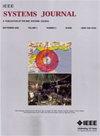Decentralized Energy Management of Multiagent Distribution Systems Considering the Grid Reliability and Agent Misbehavior
IF 4
3区 计算机科学
Q1 COMPUTER SCIENCE, INFORMATION SYSTEMS
引用次数: 0
Abstract
In recent years, the high expansion of independent energy sources and development of multiagent structures have resulted in new challenges in the efficient power management of distribution networks. In this regard, decentralized management along considering operational concerns of the system will be a key factor in running the future multiagent systems. Therefore, this article proposes a decentralized framework based on the alternating direction method of multipliers for managing the peer-to-peer (P2P) energy trading in a multiagent distribution system while considering the technical constraints and reliability of the network. This strategy facilitates considering the effects of the network reliability while running the agents’ optimization in a decentralized manner. Respectively, each agent would tend to exchange energy with more reliable agents, which would result in the resilient operation of the network. Moreover, the uncertainty of renewable energy sources is addressed using distributionally robust optimization. Additionally, with the aim of increasing the security of the P2P energy market against communication errors and agents’ misbehavior, an algorithm is developed to identify the existence of a problem in the market convergence as well as how it could be mitigated. Finally, this scheme is investigated on 37 and 69 bus test systems to study its capability in running sustainable energy systems.考虑电网可靠性和代理不当行为的多代理配电系统的分散式能源管理
近年来,独立能源的高度扩张和多代理结构的发展给配电网络的高效电力管理带来了新的挑战。在这方面,考虑到系统运行问题的分散式管理将是未来多代理系统运行的关键因素。因此,本文提出了一种基于乘数交替方向法的分散框架,用于管理多代理配电系统中的点对点(P2P)能源交易,同时考虑到网络的技术限制和可靠性。这种策略有利于在分散运行代理优化的同时考虑网络可靠性的影响。因此,每个代理都会倾向于与更可靠的代理交换能源,从而实现网络的弹性运行。此外,可再生能源的不确定性也通过分布式稳健优化得以解决。此外,为了提高 P2P 能源市场的安全性,防止通信错误和代理的不当行为,还开发了一种算法来识别市场收敛中存在的问题,以及如何缓解这些问题。最后,在 37 和 69 总线测试系统上对该方案进行了调查,以研究其运行可持续能源系统的能力。
本文章由计算机程序翻译,如有差异,请以英文原文为准。
求助全文
约1分钟内获得全文
求助全文
来源期刊

IEEE Systems Journal
工程技术-电信学
CiteScore
9.80
自引率
6.80%
发文量
572
审稿时长
4.9 months
期刊介绍:
This publication provides a systems-level, focused forum for application-oriented manuscripts that address complex systems and system-of-systems of national and global significance. It intends to encourage and facilitate cooperation and interaction among IEEE Societies with systems-level and systems engineering interest, and to attract non-IEEE contributors and readers from around the globe. Our IEEE Systems Council job is to address issues in new ways that are not solvable in the domains of the existing IEEE or other societies or global organizations. These problems do not fit within traditional hierarchical boundaries. For example, disaster response such as that triggered by Hurricane Katrina, tsunamis, or current volcanic eruptions is not solvable by pure engineering solutions. We need to think about changing and enlarging the paradigm to include systems issues.
 求助内容:
求助内容: 应助结果提醒方式:
应助结果提醒方式:


